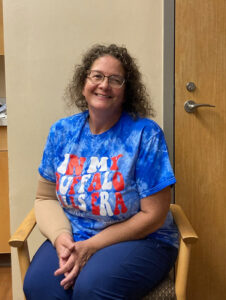A Strong Memorial Hospital nurse was diagnosed at age 36 at the same time her husband received a colon cancer diagnosis
By Deborah Jeanne Sergeant

East Bloomfield resident Jenny Lindstrom works as a nurse at Strong Memorial Hospital. But in September 2009, she received a diagnosis of breast cancer that made her a patient for a while.
She had noticed a pain in the right side of her breast and a lump. She talked about it at work and a resident at the hospital told her, “Jenny, I never mess with lumps. Please, call your doctor.”
Thankfully, Lindstrom followed that advice and soon thereafter, she received the diagnosis of cancer. She was only 36 and typically, breast cancer strikes women much older.
“I was shocked; I really didn’t think of a cancer diagnosis,” Lindstrom said.
Coincidentally, her husband, Brian, then working as a statistician, was diagnosed with colon cancer when he was 36. Lindstrom recalled a conversation between them that “there’s no way lightning can strike twice.” But it did.
Her oncologists recommended surgery first. She had a partial mastectomy and then chemotherapy and radiation. Because of her young age, her tumors were large and the cancer had invaded her lymph nodes.
“It was aggressive and it was treated very aggressively,” she said.
Her sons, Thomas and Ben, were in pre-K and first grade, respectively and her daughter, Christina, was in third. They were young enough to know something was wrong but not completely understand what lay ahead for their family.
“When we talked with them, it was very basic,” Lindstrom said. “It was what a very young kid could possibly understand.”
On Lindstrom’s treatment days, friends and family would take the kids for a playdate and sometimes a sleepover so that she could rest. Her work family at Strong Memorial Hospital, friends at the scouts where she volunteered and church friends at Ionia United Methodist Church supported her with encouragement, meals, shuttling kids and a paid weekly house cleaner.
She began treatment a couple of weeks after surgery in September. Then radiation began the following March. She stayed on a medication regimen for five years afterward and receives annual mammograms since.
“What’s interesting is you never know when you go through something like this is the people that will come into your life and how those relationships will build over time,” Lindstrom said. “Some people who had helped me I was also able to help and support later on when they or their family members had a diagnosis of breast cancer. That happened several times. It turned into a network.”
She found that the best support was encouragement, sometimes in the form of a card in her mailbox or verbal reassurance. The meal train helped her when she lacked energy to cook. It also helped her finances as she took time off from work while undergoing chemotherapy.
“I don’t think I would have done as well as I did without that support,” Lindstrom said.
She encourages anyone who notices something in their body they have not experienced before to seek prompt medical care. Preventive screenings are also vital.
“People who are diagnosed should look for other people who’ve been through the process and look for providers in healthcare you are comfortable with,” Lindstrom said.

